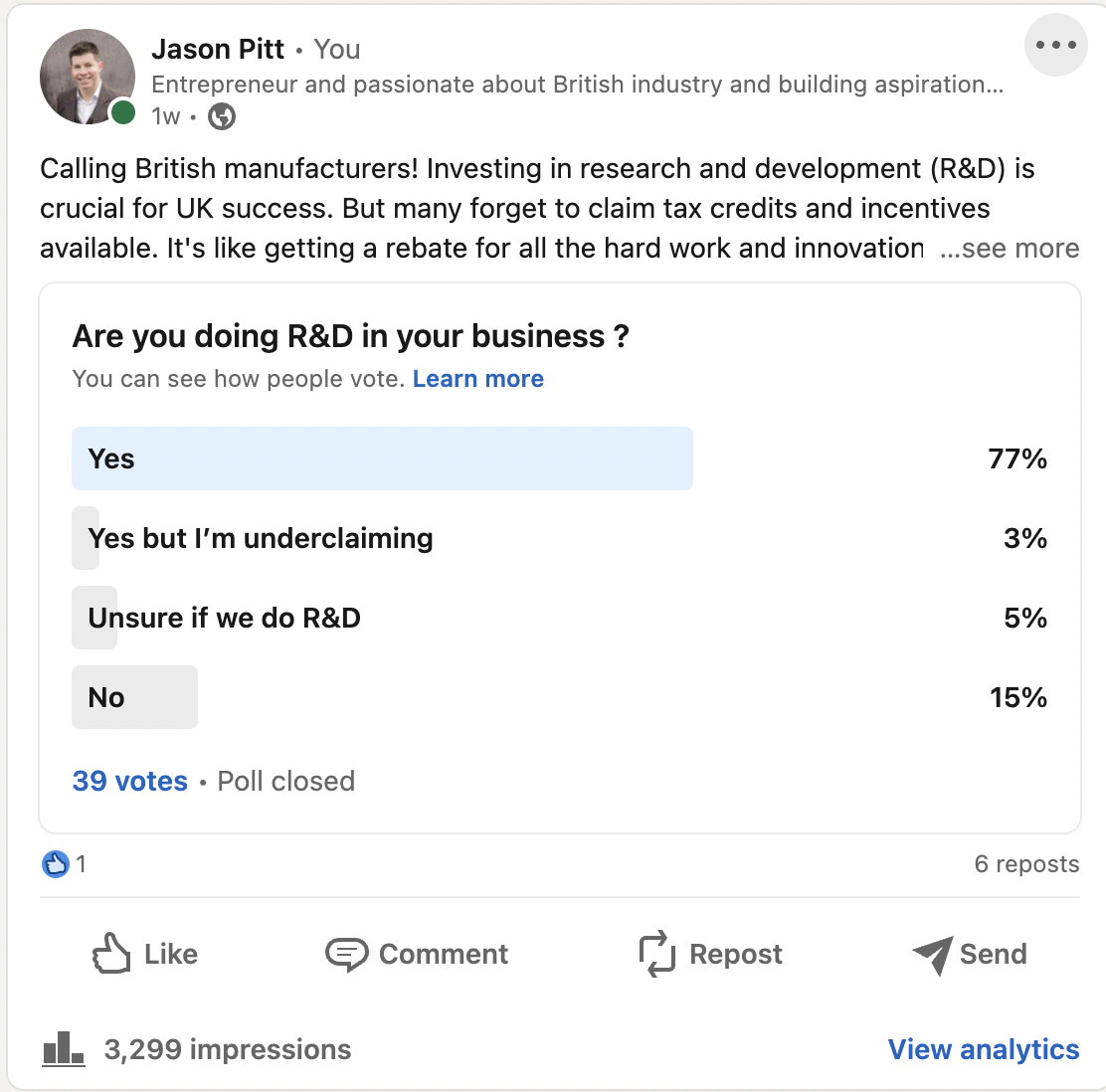This week's breakout session focused on R&D and innovation, with members such as Tony Baldassarra from Green Tweede, Steve Hemming from Fablink, David Green from Handling Concepts, Daren Lightwood from Daren Lightwood; Alwayse Ball Unit Solutions; Chris Knott from Cooper Parry; Jim Mangon, Septre, and James Miller from LK Metrology participating in the discussion.
Jason Pitt started the discussion with round-robin introductions, and members shared their best practices regarding the collection of R&D data and how they manage claims. Jason also shared insights from a poll conducted the previous week by Made in Group, which asked companies about their R&D tax claiming status. 77% of companies polled claimed they were claiming, 3% were underclaiming, 5% were unsure, and 15% were not claiming anything.

This sentiment was echoed in the discussion group, where every participant was claiming at least some R&D relief. The conversation then moved towards members sharing their best practices on how they collect data and manage claims, with Chris Knott of Cooper Parry providing insights and technical expertise from an industry and legal perspective.
Daren from Alwayse made an interesting point that the UK industry needs to reconnect with the purpose of R&D and develop a culture of innovation. He stated,
"We need to remember the reason the R&D scheme came in the first place, and that is to develop a culture of research and development in companies to maintain a country with an innovative culture."
Chris added to this idea by comparing it to the Australian model, which rewards future innovation and R&D, suggesting that rewarding what's upcoming could be progressive.
One of the biggest areas of concern for members was that R&D was not being recorded in the moment, leading to underclaiming. Some group members had ways to overcome this challenge by implementing quarterly or monthly R&D reviews and collecting information more quickly. Our keynote speaker talked about recording health and safety data on a custom app, and it was mentioned during the discussion that this could also be used for R&D, using existing systems to capture work as it's done.
Chris Knott simplified some of the jargon used in the R&D world, describing it in two words: "change" and "challenge." He also cautioned that claims are being scrutinized more carefully, and changes in the percentages smaller businesses can claim will be changing from April 1st. Some members were concerned that these tax changes could weaken the UK's position as an R&D hub, making it less competitive or attractive to international businesses. In a worst-case scenario, R&D could be moved abroad.
To summarize, some members were recording data more frequently, while others were gathering the data at the time of return, and some were spending considerable manpower for a month working solely on populating the claim itself. This highlights a gap for a simple process to record R&D and perhaps adding in a series of tools or calculations so that companies can streamline the process. Finally, members discussed the pros and cons of using an R&D adviser and paying commission or fixed fees. Some argued that commission creates two-way accountability, while others said that commission doesn't scale when the claims are higher.
The Made in Group includes Midlands and Yorkshire and each month we meet to listen to speskers form the community who share best practice and then breakout into smaller discussion gorups. The topics vary but the key themes remain the same, each month we focus on topics around; 'Sustainability', 'International Trade', People & Skills' and 'Industry 4'
Not a member? Join via the platform www.madeinthemidlands.com/join or www.madeinyorkshire.com/join

